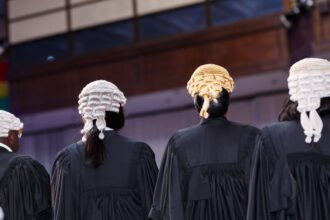
In 2023, the Superior Courts delivered significant Judgements on a wide range of issues. The judgements span substantive law, procedural law and interpretation of statutes. While some judgements affirmed long held judicial positions, others brought changes to well-known principles of law.
Here is a look at (4) four notable decisions from the Superior Courts in Ghana in 2023:
SUPREME COURT:
Prof. Appiagyei – Atua v. Ag Civil Motion No J1/14/2022
The Plaintiff in this matter, Prof. Appiagyei-Atua, argued that the Imposition of Restrictions Act, 2020 (Act 1012) practically created a dictatorial power regime alternative to the power regime that the Constitution, 1992 has established for managing public emergencies.
He had contended that, the law had given the President unilateral power to suspend fundamental human rights and freedoms of Ghanaians in the whole or a part of the country.
He had posited that Act 1012 circumvented the procedure stipulated under Articles 31 and 32 by which human rights may be suspended. It is instructive to state that the promulgation of Act 1012 followed the outbreak of the corona virus (COVID-19) pandemic.
The Supreme Court speaking through Justice Nene Amegatcher held inter alia that Act 1012 is founded on the wrong constitutional provision, i.e., Article 21(4), which only sanctions laws that restrict a continuing application. And that Act 1012, being an Act of Parliament that authorizes the taking of measures in the event or imminence of an emergency in one body is inconsistent with Articles 21, 31 and 32 of the Constitution, 1992. The Apex Court accordingly ruled to strike out the Act 1012 as same was unconstitutional, null and void.
Prof. Appiagyei- Atua v. Ag is consequential for same is an ample testimony to the reasonable or even significant headway and strides our legal system continues to make in safeguarding fundamental human rights. For its worth, it signifies a marked departure from our troubled past- see the Re Akoto case with all its infamy- and instead heralds a progressive step towards accountability of the executive arm of government within the limitations imposed under the Constitution.
This case thus highlights the importance of judicial independence, the authority of our courts and the role of the judiciary in upholding Constitutional rights and liberties of the Ghanaian citizenry.
It is also significant as it gives the assurances that the Executive power as exercised by the President under the 1992 Constitution is not sacrosanct and that the legitimacy of Executive and governmental powers (that go beyond legal and Constitutional limits) can be impeached by the Supreme Court. In short it shows that Constitutionalism is still much alive in our Jurisprudence.
In this judgement, the Supreme Court held that Intermeddling-the act of meddling in the estate of a deceased person without authority- can only be prosecuted by the Attorney General or a person acting under his power (see Article 88 of the Constitution).
This Judgement and its apparent significance stems from conflicting decisions rendered by the Court of Appeal on the matter of Intermeddling.
While the Court of Appeal in the case of (In Re Appau (Dec’d): Appau v. Ocansey [1993-1994] 1 GLR 146 had determined that Intermeddling application may be commenced by a civil process, the self-same court differently constituted held in the case of Osei Kwaku & Another v. Georgina Konadu Kusi, Suit No. delivered on 22nd April 2005) that to the extent that Intermeddling has been criminalised, intermeddling proceedings must be commenced by a charge sheet.
The Court of Appeal in the course of time in the case of Eric Akwetey Siaw & 2 Others v Tettey Siaw-Sappore & 2 others,Civil Appeal No. H1/197/2014 reverted to its earlier position on Intermeddling: holding that same be commenced at a civil forum.
The opportunity to clarify matters finally arrived in the case of Republic v. High Court (Commercial Division), Accra; Ex Parte: Yvonne Amponsah Brobbey (Gladys Nkrumah – Interested Party) and the supreme court speaking through Justice Emmanuel Yoni Kulendi drew the line between the conflicting decision.
The Apex Court Observed that, the Rules of Court Committee lacked the mandate to classify Intermeddling as an offence under Order 66 rule (3) of the High Court (Civil Procedure) Rules, 2004 (C.I. 47).
The above Judgement is significant for the certainty and the ray of light shed on the nature and ambit of intermeddling.
COURT OF APPEAL
In this judgment the central question before the court was whether a record of proceedings of a criminal trial differently constituted can be adopted by the court when a new judge is “assigned to preside over the trial.”
The appeal was mounted by The Republic after the new trial judge-in a part-heard criminal matter upon an application by The Republic-ruled to hear the case de novo/afresh.
That ruling by the High Court as a matter of law and practice could not have come as a surprise as same was in fidelity to settled practices at our criminal courts (part-heard criminal matters are usually started afresh by a new judge).
In a unanimous decision however, the Court of Appeal, reversed the decision of the trial court, Coram Gyimah J.
In my judgement, the decision of the Court of Appeal is progressive; it has the welcoming effect of enriching our jurisprudence, especially in criminal trials. The decision would promote judicial economy, ensure effective case management and cut out or reasonably reduce delays associated with part heard cases in criminal trials.
HIGH COURT:
This case generated a lot of interests. it involved a spinster who had sued a married man to enforce promises made to her by the married man as a consideration for a palour relationship.
Apart from and beneath all the resultant social media trolls and meme the suit generated, the the central legal question for court was whether the Plaintiff had established a cause of action to ground her reliefs and if indeed the court was minded to enforce the alleged promises made in a sexual or immoral arrangement,
In its Ruling, the High Court dismissed the action brought by the Plaintiff. The High Court, Accra held that the plaintiffs action was to enforce immoral contract, which the courts have with remarkable consistency refused to endorse.
The decision of the court- although not surprising- reaffirmed the established principle of law that the courts do not enforce illegal or immoral contracts, same being contrary to public policy.
Emmanuel K. Owusu-Asare is legal Practitioner and a contributory writer.











